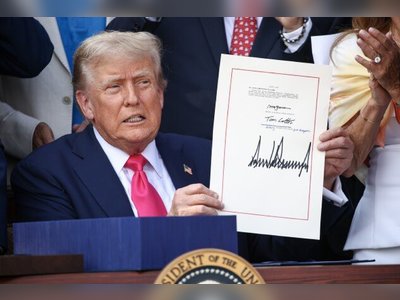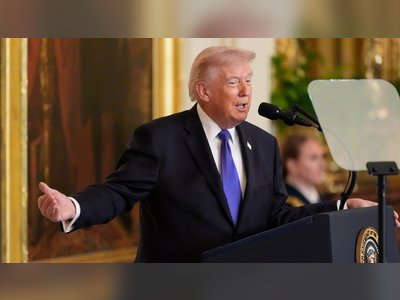Political Turbulence in France: Macron Faces Calls for Resignation
France's political landscape reshapes as the hard-left demands leadership changes following a government ousting.
In a dramatic turn of events underscoring France's volatile political climate, the hard left is intensifying its push for President Emmanuel Macron's resignation and the initiation of early presidential elections.
The call to action follows a significant parliamentary vote that resulted in the ousting of Prime Minister Michel Barnier's government, a move highlighting growing discontent within the nation's halls of power.
Mathilde Panot, the formidable leader of the France Unbowed (LFI) parliamentary faction, made the party's stance unequivocally clear during a press briefing in Paris.
'We are now calling on Macron to go,' declared Panot, signaling the LFI's readiness to address what she describes as an escalating political crisis by pressing for electoral reforms.
The pressure from France's far-left factions points to a deeper political malaise gripping the Elysee Palace.
Proponents of this demand argue that the current administration's policies have sown division, prompting a reevaluation of France's governance and leadership structure.
They argue that early elections would offer a fresh mandate to navigate the country out of its current quagmire.
However, Macron, known for his resilience and strategic acumen, has thus far shown no intention of ceding to these demands.
His administration maintains that stability is paramount and that continuity in leadership is critical in addressing France's immediate challenges, which range from domestic economic recovery in the post-pandemic era to maintaining a stable role within the European Union.
This call for resignation and elections is not just an internal affair; it resonates with broader European political dynamics at a time when many nations are grappling with their respective populist and far-left movements.
As France navigates these tumultuous waters, the repercussions of this political chess game have the potential to ripple beyond its borders, offering a case study to European and global audiences on the resilience and adaptability of democratic institutions in the face of populist pressures.
Whether this demand leads to any tangible shifts in France's political topography remains to be seen.
Nevertheless, the unfolding narrative is a testament to the vibrancy and at times, precariousness, of democratic discourse in one of Europe's central powers.
The call to action follows a significant parliamentary vote that resulted in the ousting of Prime Minister Michel Barnier's government, a move highlighting growing discontent within the nation's halls of power.
Mathilde Panot, the formidable leader of the France Unbowed (LFI) parliamentary faction, made the party's stance unequivocally clear during a press briefing in Paris.
'We are now calling on Macron to go,' declared Panot, signaling the LFI's readiness to address what she describes as an escalating political crisis by pressing for electoral reforms.
The pressure from France's far-left factions points to a deeper political malaise gripping the Elysee Palace.
Proponents of this demand argue that the current administration's policies have sown division, prompting a reevaluation of France's governance and leadership structure.
They argue that early elections would offer a fresh mandate to navigate the country out of its current quagmire.
However, Macron, known for his resilience and strategic acumen, has thus far shown no intention of ceding to these demands.
His administration maintains that stability is paramount and that continuity in leadership is critical in addressing France's immediate challenges, which range from domestic economic recovery in the post-pandemic era to maintaining a stable role within the European Union.
This call for resignation and elections is not just an internal affair; it resonates with broader European political dynamics at a time when many nations are grappling with their respective populist and far-left movements.
As France navigates these tumultuous waters, the repercussions of this political chess game have the potential to ripple beyond its borders, offering a case study to European and global audiences on the resilience and adaptability of democratic institutions in the face of populist pressures.
Whether this demand leads to any tangible shifts in France's political topography remains to be seen.
Nevertheless, the unfolding narrative is a testament to the vibrancy and at times, precariousness, of democratic discourse in one of Europe's central powers.












